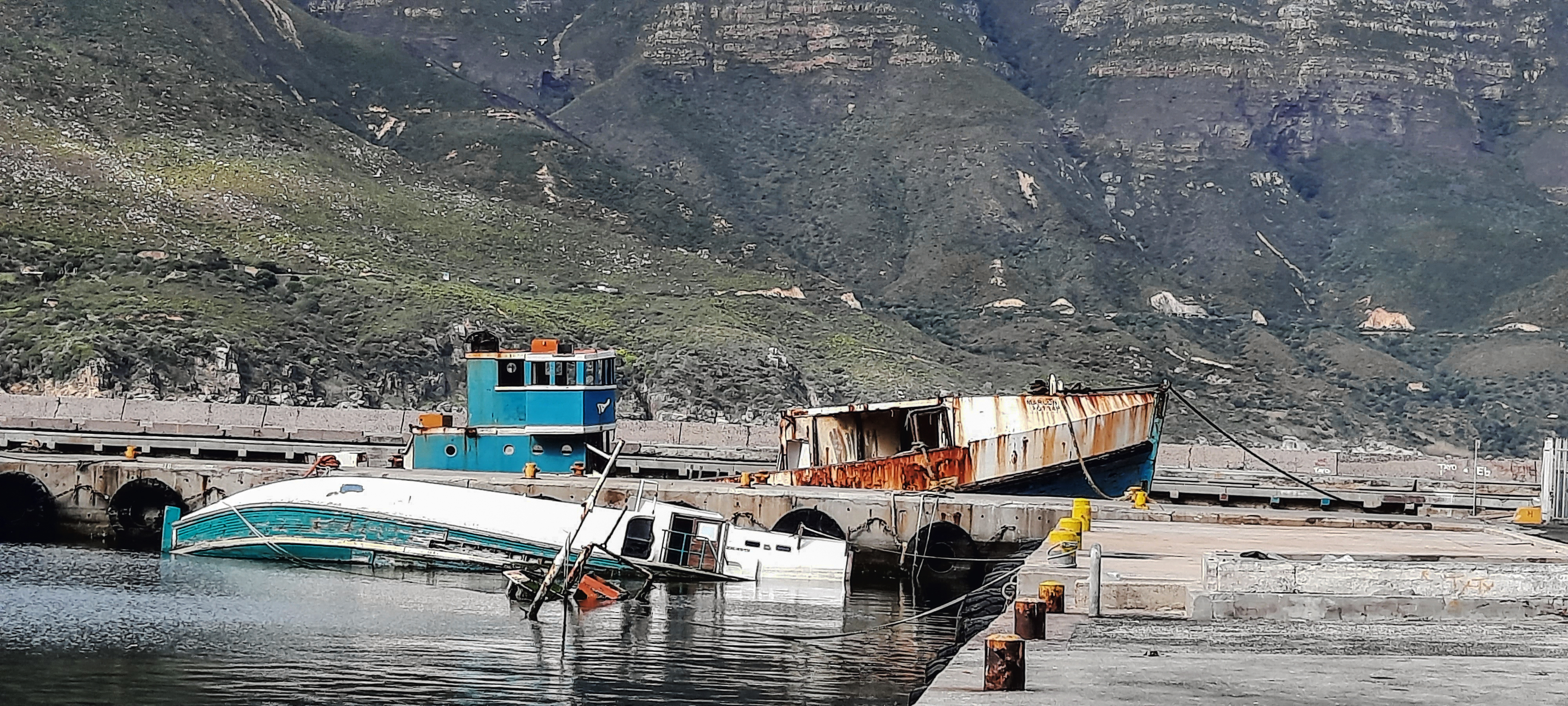The smell of salt and diesel mingles with the stench of sewage in Hout Bay Harbour. Boats bob at their moorings, their hulls patched and stained. Several have sunk. Behind them derelict buildings sag into disrepair, walkways crumble underfoot and a collapsed section of quay wall threatens to give way entirely.
This is what greeted Minister of Forestry, Fisheries and the Environment Dion George when he arrived in Hout Bay on 30 April for his “Fishing for Freedom” imbizo. For the fishers and harbour tenants gathered to meet him, it wasn’t just quotas or rights that dominated their concerns – it was the very ground beneath their feet.
“We don’t have much more time,” warned Sean Walker, a prominent figure in Hout Bay’s fishing industry, speaking forcefully during the meeting. “This harbour is in a sorry state of repair. The facilities are falling apart. It’s threatening not just businesses, but an entire working-class economy that’s been holding on by its fingernails.”
Walker’s message was echoed by Justin Strong, a representative of the Hout Bay Harbour Tenants Association and longtime operator of the popular Snoekies fish restaurant. “I’ve been attending meetings like this for 15 years,” Strong told George. “We’ve had millions spent on feasibility studies and spatial frameworks. But nothing from those plans has been implemented. Not one thing.”
/file/dailymaverick/wp-content/uploads/2025/05/Piles-of-uncollected-waste-at-Hout-NBay-harbour-Don-Pinnock.jpg)
A litany of decay
The harbour’s problems read like a checklist of neglect:
- Raw sewage spilling onto public walkways;
- Broken lighting leaving common areas in darkness;
- Non-functional water and electricity services to the jetties;
- Unsecured derelict buildings left open to squatters;
- Collapsing quay walls;
- Illegal traders intimidating customers;
- Piles of uncollected waste;
- Public toilets either shuttered or lacking basic supplies; and
- Sunken vessels occupying critically needed berths.
Strong detailed how tenants were forced to string their own lights to illuminate parking areas while their businesses battled rats, flies and a rising tide of filth.
“We light up the parking lot with six spotlights because otherwise it’s pitch dark,” he said. “There’s no meaningful security. We’ve had three break-ins at Snoekies just this past month.”
Nearby, empty hulks like the Bluefin building have stood vacant for more than a decade. Since Oceana pulled out, prime space that could be repurposed for tourism or commercial tenants stands derelict. “We keep being told to wait. But how long?” Strong asked. “Fifteen years? Twenty?”
/file/dailymaverick/wp-content/uploads/2025/05/The-once-pretty-port-is-now-a-wreck-with-no-plan-in-sight.jpg)
Falling through the cracks
The common refrain among harbour users is that no one knows who’s responsible. “For 15 years, the Department of Public Works and the Department of Fisheries have been hiding behind each other,” Strong charged. “Each says the other is responsible. Meanwhile, nothing gets fixed.”
George acknowledged the confusion. “I wasn’t even sure myself who manages the toilets,” he admitted to the crowd. But he promised to “speak to the minister concerned” in Public Works. He also proposed setting up a small forum – a liaison group that could have direct access to his office.
“I want to walk through this harbour in the future and see that it’s been fixed,” George said. “Otherwise I’ll know I failed.” But his words rang hollow for many who had heard similar promises from predecessors.
/file/dailymaverick/wp-content/uploads/2025/05/fisher-Jan-Lewis-making-a-point-to-Minister-Deon-George-Don-Pin.jpg)
At a similar imbizo in Kalk Bay, boat owner Kobus Poggenpoel, whose family has been fishers for generations, was less than impressed. “Maybe setting up yet another forum may work, maybe not. Every year politicians come and talk about transformation and integration, but nothing happens.
“We want to talk about fishing, but the minister comes and talks about harbour infrastructure, then says it is not his department’s responsibility to repair it.”
Boats held back on shore
Back in Hout Bay, while George ventured into what Poggenpoel said should be the point of the discussions – small-scale fishing rights – fishers like Walker were quick to shift the conversation back to infrastructure.
“We’re proud of our fishery,” Walker said. “Our scientists are respected internationally. Our regulations are solid. But what good is that if we can’t get ice, fuel, water or parts for our boats? If we can’t get onto the slipway? These aren’t policy problems. These are pipes, pumps, power supplies – and they’re broken.”
Walker estimated that more than 3,000 workers depended on fishing operations in Hout Bay Harbour, many of them employed directly on boats owned by small operators.
“These aren’t big corporations. These are individuals who own a boat, go out themselves and employ others. If the harbour collapses, they lose their jobs. Their families lose their livelihoods. And this community loses its heart.”
No more plans, please
Both Walker and Strong urged the government to stop deflecting and start coordinating. “If there’s one thing I ask of you,” Walker told George, “it’s this: bring Public Works and Fisheries together. Two ministers, two key officials in one room. No more feasibility studies, no more five-year frameworks. Just a concrete plan.”
He added: “We’ve had beautiful glossy plans before, volumes of them, but no action. We don’t need more paperwork. We need a working slipway. We need lights. We need the sewage sorted. We need security.”
For Regan James, a fisher and activist for local fishing rights, the decaying harbour is also a symbol of a broken social contract. “We always talk about transformation, but when will it work for our community? We’ve got poachers out here. I say bring them into the system, give them rights. Let them fish legally and support their families.”
James pointed to the limitations of the current small-scale fishing allocations, noting that species like sardine and anchovy were allocated to line fishers despite being practically inaccessible to them.
“You can’t catch a sardine on a handline. You gave us a basket we can’t even catch,” he said. “We need a rethink of what’s possible. And we need to include the youth, the poachers, the community in the harbour’s future.”
/file/dailymaverick/wp-content/uploads/2025/05/When-a-fish-processing-plant-left-the-buildings-were-vandalised.jpg)
/file/dailymaverick/wp-content/uploads/2025/05/Despite-infrastructure-collapse-Hout-Bay-is-still-a-busy-harbo.jpg)
Beyond quotas
George responded by praising the resilience of the fishing community and the international reputation of South Africa’s fisheries scientists. But he admitted that his department was underresourced, down from 700 staff to fewer than 400.
He said he had 261 continuing court challenges related to fishing rights, but that he had “thick skin like a rhino”.
“I’d love to hand out a million fish to everyone,” George said, “but there just aren’t enough fish in the sea for that.” He reiterated his belief that aquaculture and new economic models were the way forward.
But in Hout Bay Harbour, such long-term visions feel distant amid the immediate decay. “We’re being held back by things that are fixable,” Walker insisted.
“We can’t control the sea. We can’t control the weather. But we can fix a pump. We can fix a light. We can fix a jetty. And if we don’t, we’ll lose it all.”
As the meeting drew to a close, there was polite applause, but little sense of resolution. Another meeting was requested within 30 days, this time including Public Works, to finally clarify responsibilities and chart a path forward.
“It’s not just about fishing,” Walker said as the crowd dispersed. “It’s about dignity. It’s about survival. This harbour is one of the last engines of employment in this community. If it fails, what’s left?”
For now, the harbour’s fate remains tied to the same bureaucratic knots that have stymied it for decades. But the voices from Hout Bay and other small harbours are growing louder and the cracks – literal and metaphorical – are becoming harder to ignore.
George, ever courteous despite many angry deliveries from the floor, is clearly listening, but whether he can make substantial changes remains to be seen. DM
This story first appeared in our weekly Daily Maverick 168 newspaper, which is available countrywide for R35.






 Upturned wrecks are taking up space in the bay at Hout Bay Harbour. (Photo: Don Pinnock)
Upturned wrecks are taking up space in the bay at Hout Bay Harbour. (Photo: Don Pinnock)